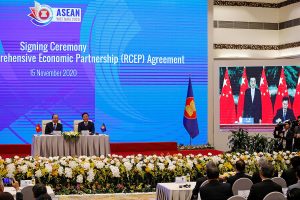THE Department of Trade and Industry (DTI) said it will offer assistance to companies seeking to maximize the benefits from the Regional Comprehensive Economic Partnership (RCEP).
Trade Assistant Secretary Allan B. Gepty, the Philippines’ lead RCEP negotiator, said the DTI will organize an international trade forum to help “empower Philippine industries not just through RCEP but the other preferential trade arrangements we have entered into,” he said, referring to the European Union’s Generalized Scheme of Preferences Plus.
The DTI is also set to launch its export development plan for 2023 to 2028 in June.
The sessions the DTI plans to conduct with potential users of RCEP include briefings on how to find export markets, business matching, and joining value chain networks, which will give enterprises “an opportunity to tie up with companies who are linked to the global value chain,” Mr. Gepty told the Senate special oversight committee on RCEP.
“The campaign will be designed to be more strategic and precise depending on the competencies of our regions and provinces,” he told the committee.
The DTI will also launch an international trade relations assistance center and an import monitoring system that will give early warning of surging imports.
The Senate gave its concurrence to RCEP on Feb. 21, making the Philippines the last to ratify the trade deal following delays caused by worries about the impact on the agriculture sector.
RCEP members represent a third of the global economy. The participating countries are Australia, China, Japan, New Zealand, South Korea, and the Association of Southeast Asian Nations (ASEAN).
RCEP is expected to take effect in the Philippines on June 2.
Agriculture Undersecretary Mercedita A. Sombilla said the department plans to expand the Bureau of Animal Industry’s livestock price and volume watch operation to all agricultural commodities to provide “real time updates of the supply and demand situation (and) prices of agricultural products.”
Ms. Sombilla added that the private sector, through the Philippine Council for Agriculture and Fisheries, will “help in the participatory, monitoring and tracking of Department of Agriculture (DA)-funded programs and projects and their interventions in the regional and local levels.”
Its committees focus on rice, high-value crops, livestock, fisheries, and corn products.
Raul Q. Montemayor, chairman of the Federation of Free Farmers (FFF) said the agriculture sector’s RCEP preparations still require more “dedicated, in-depth discussion.”
“Most of these are old programs and frankly they do not work, because our deficit is just increasing,” Mr. Montemayor told the panel. The Philippines’ agricultural trade deficit widened to $3.22 billion in the fourth quarter of 2022.
United Broiler Raisers’ Association President Elias Jose M. Inciong called for a revival of a market information system, making it open to farmers, fisherfolk, cooperatives, traders, processors, the DA, and local governments.
“We have been asking for its resurrection in this administration since July 2022,” Mr. Inciong told BusinessWorld, referring to the National Information Network (NIN), as authorized by Republic Act No. 8435 or the Agriculture Fisheries Modernization Act of 1997.
The NIN is expected to address inconsistencies in agencies’ agricultural data. “When you plan and decide, you base it on data that everybody agrees on,” he said.
Anthony Aguirre, Foreign Affairs undersecretary for Multilateral Affairs and International Economic Relations, said the RCEP instrument of ratification was submitted to the ASEAN on April 3.
The DTI has completed a draft executive order and a customs memorandum order which will take effect on the same day as RCEP.
The schedule of tariff commitments has been transposed to the current tariff lines and is set for approval by the National Economic and Development Authority, according to Mr. Gepty.
FFF National Manager Leonardo Q. Montemayor told the committee that groups opposing RCEP will launch on May 8 the Bantay RCEP, a watchdog that will monitor its implementation as well as campaign for support for local products.
RCEP is “not a magic pill but it’s important to have a roadmap done immediately,” Senate President Pro-Tempore Lorna Regina B. Legarda, who heads the oversight committee, said.
RCEP is projected to generate 1.4 million jobs for the country by 2031, Senate President Juan Miguel F. Zubiri said. —
